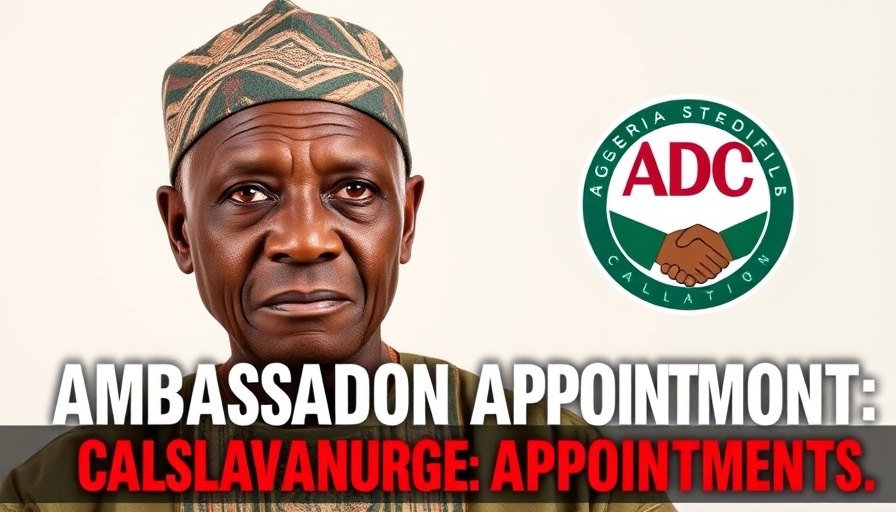
How Nigeria’s Diplomatic Vacuum is Impacting Foreign Relations
The African Democratic Congress (ADC) has recently voiced strong criticism regarding President Bola Tinubu's failure to appoint ambassadors for Nigeria, a scenario unfolding nearly two years into his administration. As international relations remain crucial for national development, this period of absence in effective representation threatens Nigeria's influence on the global stage.
The video ADC Criticises Tinubu Over Failure to Appoint Ambassadors highlights the urgent need for Nigeria to address its diplomatic representation, prompting deeper analysis on the associated consequences.
The Silence from the Presidency: A Call for Action
As pointed out by Bulaji Abdulahi, the ADC's interim national publicity secretary, the lack of urgency in appointing ambassadors speaks volumes about the current administration's stance on foreign policy. The recall of Nigerian ambassadors from 109 countries without their swift replacement has left Nigeria with only junior diplomats representing its interests abroad—a situation seen as inadequate.
In the critical realm of international diplomacy, ambassadors serve not only as representatives but as strategists and advocates for their country's interests. Without these key figures, Nigeria's presence and voice throughout the African continent and beyond are alarmingly muted. The failure to fill these crucial roles may be viewed as neglectful, signaling to the world that Nigeria, often touted as the 'giant of Africa', is uninterested in maintaining its global relationships.
Lost Opportunities: The Cost of Inaction
Mr. Ojo, a public affairs analyst, warns of the repercussions stemming from this diplomatic vacuum. Nigeria is witnessing a decline in social capital and goodwill, particularly as it relates to its citizens living abroad. He argues that issues such as the mistreatment of Nigerians in countries like South Africa, the UAE, and the United States could have been mitigated with a robust diplomatic presence advocating for individuals affected.
Moreover, Nigeria's diplomatic ineffectiveness can directly correlate to missed economic opportunities. Critical economic partnerships and foreign direct investments hinge on Nigeria's representation at international platforms, which have diminished due to the failure to appoint ambassadors. The latest absence was stunningly evident as Nigeria missed invitations to significant forums presided over by U.S. leaders, crucial for coalition-building and discussing economic support.
A Diplomatic Crisis in a Globalized World
Nigeria operates in a globalized environment, where diplomats are essential in navigating the complexities of international relations. The current administration's neglect of this fact is disheartening. Ojo's remark that if junior diplomats could suffice, the role of ambassadors would not exist, accurately highlights the inherent deficiencies in relying solely on less experienced personnel to advance national interests.
The world has become a tightly knit village—the repercussions of Nigeria’s diplomatic shortcomings resonate far beyond the immediate implications, affecting its stature as a leader on the continent.
Political Tactics or Oversight? Exposing the Administration’s Approach
The lack of appointments could signal either a broader political tactic or simple oversight. Observers find it difficult to believe that in such a resource-rich nation, a lack of qualified candidates exists within the Ministry of Foreign Affairs or among the Nigerian elite. The absence of nominations for nearly two years raises serious questions about the administration’s commitment and strategic direction regarding foreign relations.
Contrary to plausible explanations such as budget constraints, the expectation remains that Nigeria’s wealth positions it to adequately fund its diplomatic missions globally. Considering innovative staffing options—like a single ambassador covering multiple countries—could be a viable solution and operative model that aligns with practical resource management while still maintaining a diplomatic presence.
Future Implications: What Lies Ahead for Nigeria?
Unless corrective actions are taken, Nigeria risks losing its status and influence in the international community. Without ambassadors who can effectively advocate for the nation’s interests, deal-making opportunities and crucial dialogues will perpetually fall short. It is imperative for the Tinubu administration to acknowledge the urgency of spearheading appointments for ambassadors, embracing the necessity of strong diplomatic representation.
The ADC's challenge should not merely be seen as political posturing but as a genuine call to accountability for a nation that has immense potential. Nigeria stands at a crossroads; the choices made today will define its future trajectory on the international stage.
Conclusion: The Need for a Bold Diplomatic Strategy
It is crucial for Nigeria to reassess its foreign policy objectives and recognize that a strong and active diplomatic corps is essential for its global standing. Representations are not just bureaucratic; they are the lifeblood of diplomacy that can enhance Nigeria’s social, economic, and political capital. As we analyze the words of Bulaji Abdulahi and the implications of Nigeria’s current dilemmas, it becomes evident that a proactive approach is needed to reinstate the country’s diplomatic relevance.
 Add Row
Add Row  Add
Add 


Write A Comment